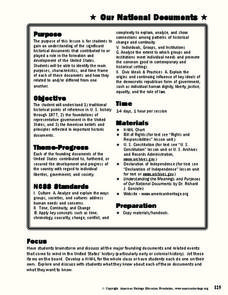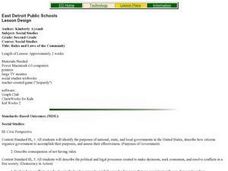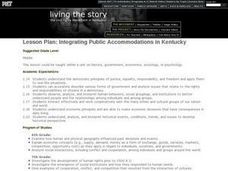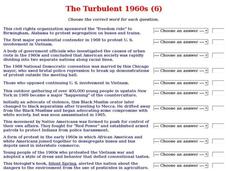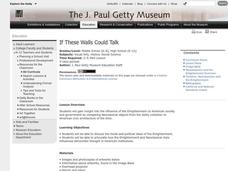Curated OER
Our National Documents
Students consider the significance of selected American documents. In this civics lesson plan, students analyze excerpts of the Declaration of Independence, the U.S. Constitution, and the Bill of Rights.
Curated OER
Rules and Laws of the Community
Second graders recognize and identify the need for rules in school. They also discuss the importance of safety rules at school, home, and in the community. They illustrate a rule which they have learned in class, and write letters to the...
Curated OER
Integrating Public Accommodations in Kentucky
Learners watch videos and conduct research on the belief systems and values related to segregation in Kentucky.
Curated OER
The Civil Rights Movement in Kentucky
Eleventh graders examine how current race relations in their town compare to those of the 1960's.
Curated OER
African Folk Tales
Seventh graders listen to, recite, and research African folktales. They research African artwork to add to their original folk tales which they write.
Curated OER
Early Presidents and Politics
Students investigate early presidents of the United States. Students complete a series of lessons in which they research the contributions and political climate during the terms of U.S. presidents from George Washington to Andrew Jackson.
Curated OER
Hitler¿¿¿s Fatal Gamble ? Comparing Totalitarianism and Democracy
Students compare/contrast totalitarianism and democracy and examine their roles in World War II. They read a handout, complete a Venn diagram, and participate in a class discussion.
Curated OER
Imposing Democracy
Twelfth graders discuss the probability of imposing a democracy in a country in which there is no history of this type of government being successful. Using the internet, they work together to research Japan's experience with democracy...
Curated OER
Literature and the "Age of Anxiety" (1920s and 1930s).
Students examine historical events of the 1920s, World War II and the Cold War. They discover how literature reflects the economic, political, social, religious and historical concerns of a culture. Students compare literature writings...
Curated OER
The Need for Government
Students, in groups, play a game of skill in which the outcome depends on decisions the other players make. After playing they discuss the game and how they liked playing a game that was controlled by the decisions othe rpeople made. ...
Curated OER
Give Me Liberty
Students define the term "liberty." They explore the concept of liberty in our nation's history and how it is reflected throughout our rich culture. Students connect the office of the presidency to our nations' development and its place...
Curated OER
Understanding The Progressives And Their Viewpoints
Eleventh graders explore the Progressive Era in American history (1900-1917). They use the internet and other sources to research the Progressive Movement, identify three Progressive presidents, and explore considered reforms. Students...
Curated OER
Rolling in Dough
Students make play dough. In this cooperation lesson, students practice working together in a group. Students work in small groups to make play dough. They discuss how they cooperated and how it was beneficial to completing the project.
Curated OER
Can You Make a Difference?
Students write and present a speech. In this service instructional activity, students read an anecdote adapted from The Star Thrower and discuss their feelings about their ability to make a difference in the world. Students make a...
Curated OER
Long-Term Goals
Young scholars set long-term and short-term goals. In this character education lesson, students determine whether goals that they write for themselves are long-term or short-term.
Curated OER
The Turbulent 1960s (6)
In this online interactive American history worksheet, students answer 13 matching questions regarding 1960's America. Students may submit their answers to be scored.
Curated OER
The Second Amendment and the Right to Bear Arms
High schoolers interpret the Second Amendment. In this U.S. Constitution lesson, students examine the right to bear arms as they compare 2 Michigan Supreme Court cases and discuss their personal interpretations of the amendment.
Curated OER
The United States Flag
Students investigate the history of the United States flag. In this civics lesson, students read handouts regarding the flag and its history. Students also read and discuss the Federal Flag Code.
Curated OER
If These Walls Could Talk
Students explore Enlightenment and Neoclassical art. In this visual arts lesson, students compare and contrast images of architecture from both styles. Students create visual art designs that feature the ideals of the Enlightenment.
Curated OER
Rock n' Rollin in the '50s
Students explore the culture of the United States in the 1950's. In this history lesson plan, students research culture in the 1950's, with a focus on fashion, music, television, automobiles, etc., then work in groups to create a...
Curated OER
The Union is Perpetual: Lincoln is Elected
Students take a closer look at the election of Abraham Lincoln. In this historical analysis lesson, students analyze letters, political cartoons, and campaign materials from Lincoln's campaign. Analysis worksheets are included.
Curated OER
The Abolitionist Movement: A Fight for Freedom
Sixth graders investigate the Civil War by identifying famous figures of the era. In this slavery abolitionist lesson, 6th graders read a text on the history of the Civil War and discuss heroes of the era such as Harriet Tubman and John...
Curated OER
Chapter 2 – The US From 1789 to 1815
In this U.S. history activity, students read assigned textbook pages about the country from 1789-1815 and respond to 36 short answer questions.
Curated OER
Chapter 6 – Road to the Civil War
In this U.S. history worksheet, learners read assigned textbook pages detailing the causes of the Civil War and respond to 37 short answer questions.


